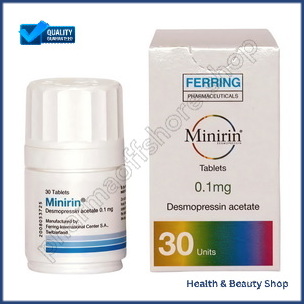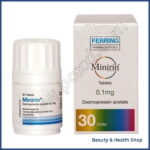ADDICTION
ALCOHOL DEPENDENCE
QUIT SMOKING
ALLERGY
ANTI FUNGAL
FUNGAL INFECTION
FUNGAL NAIL INFECTIONS
ANTI-REJECTION DRUGS
ANTI WORM
ANTIBIOTIC
BACTERIAL INFECTIONS
ARTHRITIS
GOUT
OSTEOARTHRITIS
RHEUMATOID ARTHRITIS
BLOOD
LOW PLATELET COUNT
THROMBOPHLEBITIS
VARICOSE VEINS
COLON
ANAL FISSURE
PILES
ULCERATIVE COLITIS
DIABETES CARE
DIABETES INSIPIDUS
DIABETES TYPE
DIABETIC FOOT ULCERS
GLUCOSE MONITOR
EYES/EAR CARE
DRY EYES
EYE CARE
EYE EXAMINATION
EYE INFECTION
EYE LASHES
EYE PAIN
GLAUCOMA
OCULAR HYPERTENSION
UVEITIS
FEVER CARE
MALARIA
RHEUMATIC FEVER
TYPHOID FEVER
GASTROINTESTINAL
ACIDITY
CONSTIPATION
CROHN'S DISEASE
DIARRHOEA
GALLBLADDER STONES
INTESTINAL ULCERS
IRRITABLE BOWEL SYNDROME
MOTION SICKNESS
NAUSEA
Minirin 0.1 mg (Desmopressin)
| Active Ingredient (Generic Name): | Desmopressin |
|---|---|
| Indication: | Diabetes insipidus, Bed-wetting |
| Manufacturer: | Ferring Pharmaceuticals |
| Packaging: | 30 tablets in one strip |
| Strength: | 0.1 mg |
From: $56.00
Desmopressin, or Minirin 0.1 mg, treats diabetes insipidus, bedwetting, and bleeding disorders like hemophilia A. It decreases urine production in diabetes insipidus and night-time urine in bedwetting. For hemophilia A, it boosts von Willebrand factor and factor VIII release. Desmopressin helps manage thirst and bedwetting in children and controls bleeding in von Willebrand disease and mild hemophilia A. Take it orally as prescribed; don’t exceed the dose without consulting. Check for drug interactions, watch for side effects, and store at room temperature. Brand names include Minirin and DDAVP. Seek medical help for an overdose. Important usage and safety details are essential.
To begin exploring the subtopic, consider the fundamental aspects of Desmopressin (Minirin 0.1 mg) and its uses in medical treatment. Desmopressin, commonly known by the brand name Minirin 0.1 mg, is a synthetic form of vasopressin, a hormone that regulates water balance in the body. This medication is primarily used to treat conditions such as diabetes insipidus, bedwetting (nocturnal enuresis), and certain bleeding disorders like hemophilia A.
In diabetes insipidus, where the body is unable to properly conserve water, Desmopressin helps by reducing the amount of urine produced and controlling excessive thirst. For bedwetting, especially in children, it works by decreasing the production of urine at night, aiding in dry nights. In individuals with hemophilia A, Desmopressin stimulates the release of von Willebrand factor and factor VIII, essential for blood clotting.
Understanding these fundamental uses of Desmopressin is important in comprehending how this medication can effectively manage various medical conditions.
Why is this medication prescribed?
When considering why Desmopressin (Minirin 0.1 mg) is prescribed, it is important to understand the specific medical conditions it effectively treats. Desmopressin is primarily prescribed to manage conditions related to excessive urination and thirst, such as diabetes insipidus. This medication helps reduce the amount of urine produced by the kidneys, leading to decreased thirst and improved hydration levels. Additionally, Desmopressin is used to treat bedwetting in children by regulating the body’s production of urine during sleep.
Desmopressin is also prescribed to individuals with von Willebrand disease or mild hemophilia A to help control bleeding episodes. By promoting the release of von Willebrand factor and factor VIII in the blood, Desmopressin aids in clot formation, reducing the risk of excessive bleeding. Furthermore, this medication may be recommended for individuals undergoing certain surgical procedures to prevent or reduce excessive bleeding. Overall, Desmopressin plays an important role in managing various medical conditions related to urine production, thirst, and bleeding disorders.
How should this medicine be used?
For peak effectiveness, administer Desmopressin (Minirin 0.1 mg) according to the prescribed dosage and schedule provided by your healthcare provider. Typically, this medication is taken by mouth, usually once a day. It is important to follow the instructions given by your doctor or pharmacist carefully. You may take Desmopressin with or without food, but it is best to take it consistently in relation to meals. Swallow the tablet whole with a glass of water. Avoid breaking, crushing, or chewing the tablet unless advised otherwise by your healthcare provider. If you forget to take a dose, take it as soon as you remember, unless it is close to the time of your next dose. In that case, skip the missed dose and continue with your regular dosing schedule. Do not double up on doses to make up for a missed one. It is essential to keep track of your medication intake and never exceed the prescribed amount without consulting your healthcare provider.
Other uses for this medicine
If recommended by your healthcare provider, Desmopressin (Minirin 0.1 mg) may be utilized for conditions such as bedwetting in children. This medication operates by aiding the kidneys to concentrate urine, reducing the amount of urine produced at night, which can be advantageous for managing bedwetting issues. Additionally, Desmopressin is sometimes employed off-label for conditions like diabetes insipidus, a rare disorder that causes excessive thirst and urination due to a lack of vasopressin, a hormone that regulates water balance in the body. In these instances, Desmopressin helps to control excessive urination and thirst by replacing the vasopressin hormone. It is crucial to follow your healthcare provider’s instructions diligently when using Desmopressin for these alternative purposes to guarantee safe and effective treatment. Always consult with your healthcare provider before using Desmopressin for any condition other than what it is specifically prescribed for to prevent potential risks and complications.
What special precautions should I follow?
Before taking Desmopressin, it is important to check for any potential drug interactions with your current medications. Inform your healthcare provider about any other drugs, supplements, or herbal products you are taking to avoid any adverse effects. It is vital to follow your doctor’s guidance closely to guarantee the safe and effective use of Desmopressin.
Check for Drug Interactions
Be mindful of potential drug interactions when taking Desmopressin (Minirin 0.1 mg) to guarantee safe and effective use.
-
Consult your healthcare provider: Before starting Desmopressin, inform your doctor about all medications, supplements, and herbal products you are taking to avoid any interactions that could impact the effectiveness of Desmopressin.
-
Monitor for signs of interactions: Be vigilant for symptoms like increased or decreased urine output, changes in blood pressure, or electrolyte imbalances, as these could indicate a potential interaction with other medications.
-
Follow dosage instructions carefully: Stick to the prescribed dose of Desmopressin as altering the dosage without medical advice may lead to adverse reactions when combined with other drugs.
What special dietary instructions should I follow?
To maintain proper hydration levels, make sure you drink an adequate amount of fluids while taking Desmopressin (Minirin 0.1 mg). It is essential to follow a balanced diet rich in fruits, vegetables, whole grains, and lean proteins. Avoid excessive intake of foods high in salt, as Desmopressin can cause fluid retention, leading to potential complications. Monitoring your fluid intake is important, as Desmopressin affects how your body regulates water balance. Be mindful of your caffeine consumption, as it can interfere with the medication’s effectiveness. Alcohol can also impact the way Desmopressin works in your body, so it is advisable to limit alcohol intake. Consult your healthcare provider or a dietitian for personalized dietary recommendations while taking Desmopressin. Maintaining a healthy lifestyle, including a well-balanced diet and adequate hydration, can optimize the benefits of Desmopressin therapy and support your overall well-being.
What should I do if I forget a dose?
If you overlook a dose of Desmopressin (Minirin 0.1 mg), take it as soon as you recall. However, if it is near the time for your next planned dose, skip the missed dose and continue with your regular dosing schedule. Do not double the dose to compensate for the missed one, as this can result in an overdose. It is crucial to maintain a consistent dosing schedule to guarantee the medication’s effectiveness and minimize the risk of side effects. If you frequently forget doses, consider setting alarms or reminders to help you recall. You can also use a pill organizer to keep track of your medication intake. If you have any concerns or questions about missed doses or how to manage your medication schedule, consult your healthcare provider for guidance. Remember, consistency is key when taking Desmopressin to effectively manage your condition.
What side effects can this medication cause?
When taking Desmopressin, it’s important to monitor for any persistent side effects. Some side effects can be serious, and if you experience symptoms like severe headache, confusion, or seizures, contact your doctor immediately. Being aware of these potential side effects is vital for your safety and well-being while using this medication.
Monitor for Persistent Side Effects
Common side effects of Desmopressin (Minirin 0.1 mg) include headache, nausea, and abdominal pain. When taking this medication, it’s crucial to monitor for any persistent side effects that may arise. Here are some side effects you should watch out for:
- Fluid Retention: Pay attention to any sudden swelling in your hands, feet, or ankles, as this could indicate fluid retention.
- Hyponatremia: Be alert for symptoms such as confusion, headache, or muscle weakness, which might suggest low sodium levels in your blood.
- Allergic Reactions: Look out for signs of an allergic reaction like rash, itching, swelling, dizziness, or difficulty breathing, and seek immediate medical attention if you experience any of these symptoms.
Some side effects can be serious. If you experience any of the following symptoms, call your doctor immediately:
Some side effects of this medication can be serious; if you experience any of the following symptoms, you should call your doctor immediately.
- Severe headache: Intense and persistent headaches can indicate a potential issue that needs medical attention.
- Difficulty breathing: If you find it hard to breathe or experience shortness of breath, it could signal a serious reaction.
- Swelling: Sudden swelling of the face, throat, or extremities can be a sign of a severe allergic reaction.
What should I know about the storage and disposal of this medication?
To guarantee the effectiveness and safety of Desmopressin (Minirin 0.1 mg), it is essential to store and dispose of this medication properly. Store Desmopressin at room temperature away from light and moisture. Avoid storing it in the bathroom. Keep it out of reach of children and pets to prevent accidental ingestion. Do not freeze the medication. Check the expiration date before use and discard any expired medication.
When it comes to disposal, do not flush Desmopressin down the toilet or pour it down the drain unless instructed to do so. Properly discard this medication when it is no longer needed or has expired. Consult your pharmacist or local waste disposal company for guidelines on how to safely dispose of Desmopressin. You can also ask your healthcare provider for advice on the proper disposal of unused medications. Following these storage and disposal guidelines will help guarantee the medication remains effective and does not pose any risks to individuals or the environment.
In case of an emergency/overdose
In the event of an emergency or overdose involving Desmopressin (Minirin 0.1 mg), immediately seek medical assistance. An overdose of Desmopressin can lead to serious symptoms such as confusion, drowsiness, severe headache, nausea, vomiting, and in severe cases, seizures. It is important to contact emergency services or go to the nearest emergency room if you suspect an overdose. When seeking medical help, provide as much information as possible about the amount of Desmopressin taken and any symptoms experienced.
Do not attempt to treat an overdose of Desmopressin at home. Emergency medical professionals are equipped to handle such situations effectively. It is essential to act swiftly in cases of overdose to prevent any potential complications. Remember that quick medical intervention can make a significant difference in the outcome of an overdose situation. Stay calm, and prioritize seeking professional medical assistance promptly.
What other information should I know?
When considering Desmopressin (Minirin 0.1 mg), it is important to be aware of potential side effects and proper usage guidelines. Desmopressin is typically taken by mouth as directed by your doctor, usually once daily. It is vital to follow the prescribed dosage and not exceed it, as this can lead to serious side effects.
Inform your healthcare provider about your medical history, especially if you have conditions like kidney disease, high blood pressure, or a history of hyponatremia. Additionally, disclose all the medications you are currently taking, as they may interact with Desmopressin.
It is essential to stay well-hydrated while taking Desmopressin to prevent dehydration. Be cautious when consuming fluids, as overhydration can also be harmful. Monitor your fluid intake as directed by your healthcare provider.
If you experience symptoms like headache, nausea, vomiting, or swelling while taking Desmopressin, contact your doctor promptly. In case of any severe side effects like seizures or trouble breathing, seek immediate medical attention.
Brand names
Considering Desmopressin (Minirin 0.1 mg), you may find this medication available under various brand names. Here are some of the common brand names under which Desmopressin is marketed:
| Brand Name | Manufacturer |
|---|---|
| Minirin | Ferring Pharmaceuticals |
| DDAVP | Ferring Pharmaceuticals |
| Stimate | CSL Behring |
| Nocutil | Ferring Pharmaceuticals |
These brand names may differ depending on the country or region in which you are located. It’s crucial to verify you are obtaining the correct medication regardless of the brand name. Always consult your healthcare provider or pharmacist if you have any doubts or concerns about the brand of Desmopressin you are prescribed. Familiarizing yourself with the various brand names can help you identify the medication accurately when filling your prescription.
Purchase Options
To explore your options for purchasing Desmopressin (Minirin 0.1 mg), check with your local pharmacies or online retailers. Local pharmacies are a convenient option as they provide face-to-face interactions with pharmacists who can offer guidance on the medication. They may also have the medication in stock for immediate purchase. Online retailers offer the convenience of ordering from the comfort of your home and having the medication delivered to your doorstep. When purchasing online, make sure that the retailer is reputable and sells genuine medications to avoid counterfeit products. Some online retailers may also offer discounts or promotions that can help you save on costs. Compare prices between different pharmacies and online retailers to find the best deal. Additionally, consider discussing with your healthcare provider or insurance company to explore any coverage options that may help offset the cost of Desmopressin.
To summarise
For a quick overview of the key points discussed regarding purchasing Desmopressin (Minirin 0.1 mg), consider the following summary.
Desmopressin, marketed as Minirin 0.1 mg, is primarily used to treat conditions like diabetes insipidus and bedwetting in children. When looking to purchase Desmopressin, it’s important to consult a healthcare provider for a prescription, as this medication requires medical supervision due to its potential side effects and dosage adjustments. Once prescribed, you can acquire Desmopressin from licensed pharmacies or online platforms, ensuring they are reputable to guarantee the authenticity and quality of the medication. Pricing may vary depending on the brand, dosage strength, and quantity needed, so comparing prices from different sources can help you find the most cost-effective option. Remember to follow the prescribed dosage and administration instructions strictly to guarantee the medication’s effectiveness and minimize the risk of adverse effects. If you encounter any difficulties or have concerns about the medication, always consult your healthcare provider for guidance and support.








There are no reviews yet.